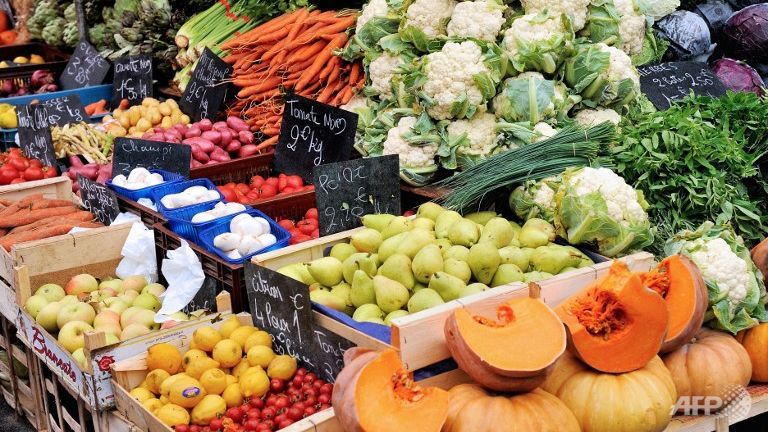After Uber and Airbnb, meal-sharing sites under fire in France
 |
| A file picture taken on Aug 18, 2013 shows fruit and vegetable stalls at a market in Lille. (Photo: AFP/Philippe Huguen) |
PARIS: First taxis rose up against Uber, then hotels challenged Airbnb and now, restaurants in France are taking on meal-sharing sites they believe create unfair competition and could sap jobs.
The websites, where hosts offer to cook a meal at their homes for a price of their choosing, are increasingly popular among travelling food-lovers who want to meet locals on top of the usual tourist visits, particularly in gourmet havens like France.
Spooked by the success of Airbnb in the accommodations sector, restaurant owners in France are getting concerned that they will take some of their business away.
"At the moment, these sites have around 3,000 offerings in France, which you could say is not so worrying," said Didier Chenet, the head of restaurateurs' union Synhorcat who is to raise the issue with Commerce Minister Martine Pinville on Monday.
"But if you look at Airbnb, in 2012 they had 7,000 homes in France, now they have 50,000," he said, adding that in three to five years, there could be 20,000 "illegal restaurants" as he calls the hosts' offerings.
From macaroons in Paris, spaghetti carbonara in Rome to an Italian aperitivo in New York or a gluten-free Cantonese dinner in Hong Kong, the sites operate like Airbnb, with hosts given reviews and marks according to the quality of their service.
Chenet argues they are a commercial offering, as some hosts make a profit on the meals they cook.
"They don't respect any rules in terms of hygiene, food health, licences - you need a licence to distribute alcoholic drinks - the origin of products, allergies ... Everything that is imposed on us today."
But Camille Rumani, co-founder of VizEat, which offers host meals in more than 50 countries, says the concept is not meant to compete with established restaurants.
"Our hosts are amateurs who have guests occasionally, on average once a month in big cities," she said.
"It's not additional revenue of any significance for them, their aim is to showcase their culture, to share with people who come from all over the world.
"When travellers come to France for one or two weeks, they will do the VizEat experience once ... It's more of a fun activity than a catering activity."
The clash between strictly-regulated industry professionals and companies in the sharing economy has become all-too-familiar in France, where the so-called "Uberisation" of the economy raises hackles.
Protests against ride-booking app Uber turned violent in June, with taxi drivers setting fire to vehicles and blocking highways in anger at a service they argued was unfair competition.
Eventually, the private driver service was forced to suspend its low-cost option.
Hotel owners have also risen up against Airbnb, which has since announced it will collect from its customers the daily tourist taxes that hotel guests have to pay.
What the stars mean:
★ Poor ★ ★ Promising ★★★ Good ★★★★ Very good ★★★★★ Exceptional
Themes: Ride-hailing services
Latest News
More News
- France supports Vietnam’s growing role in international arena: French Ambassador (January 25, 2026 | 10:11)
- Foreign leaders extend congratulations to Party General Secretary To Lam (January 25, 2026 | 10:01)
- Russian President congratulates Vietnamese Party leader during phone talks (January 25, 2026 | 09:58)
- Worldwide congratulations underscore confidence in Vietnam’s 14th Party Congress (January 23, 2026 | 09:02)
- Political parties, organisations, int’l friends send congratulations to 14th National Party Congress (January 22, 2026 | 09:33)
- 14th National Party Congress: Japanese media highlight Vietnam’s growth targets (January 21, 2026 | 09:46)
- 14th National Party Congress: Driving force for Vietnam to continue renewal, innovation, breakthroughs (January 21, 2026 | 09:42)
- Vietnam remains spiritual support for progressive forces: Colombian party leader (January 21, 2026 | 08:00)
- Int'l media provides large coverage of 14th National Party Congress's first working day (January 20, 2026 | 09:09)
- Vietnamese firms win top honours at ASEAN Digital Awards (January 16, 2026 | 16:45)
















 Mobile Version
Mobile Version